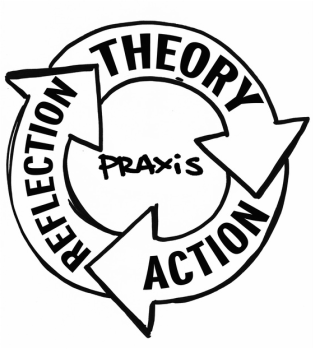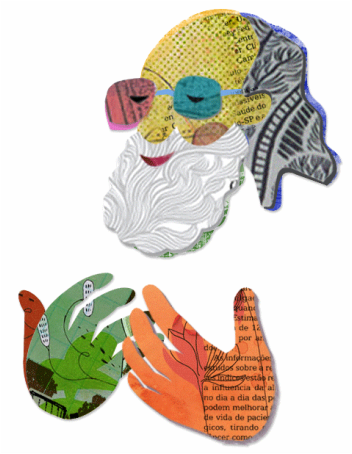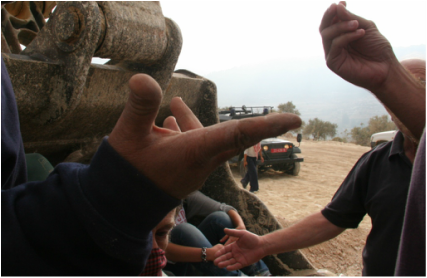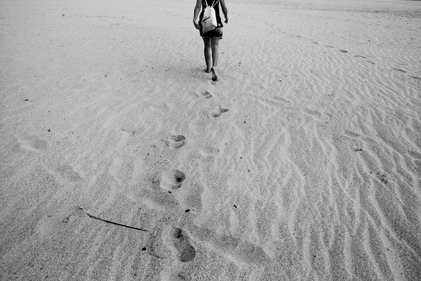What do we mean by "Critical Education"?
We believe there are some key principles that underpin critical education...
Questioning
For us, critical education holds questioning as central to learning, and highlights problem-posing as the key role of the educator - rather than to give or “preach” answers.
PraxisThe process of praxis is key to achieving 'transformation': all 3 elements - reflection/theory/action - are necessary components of effective learning for social change.
We could speak at length around a formal definition of what critical education (also referred to as critical pedagogy or popular education) is, and come up with a variety of answers.
There are a range of academic definitions of critical education, hundreds of articles/books/websites on the subject, and an army of organisations/groups articulating their conception of what critical education is (see our resource page if you don't feel like google-ing all this). Alternatively we can look back to the work and writing of past and present theorists and practitioners, such as Paulo Freire (considered by many to be the “father” of critical and popular education), Henry Giroux, Ivan Illich, bell hooks, Michael Apple, and Peter McLaren, among others, for their views on what constitutes critical education. All of these insights, theories and ideas are important/influential (that's why we've provided a resource page), - but they are also hugely diverse, contradictory and (more often than they should be), messy. Whilst a key role for the project will be to engage with this messiness - what we feel is important to answer here, is what we, in this project (at this point*), mean by critical education. For us critical education is:
For us critical education is a “school” of educational thought and practice in which the deeply (socio)political nature and potential of education (both formal and non-formal), is not only recognised, but seen as key in bringing about social change from the ground up and challenging power structures locally and globally. In other words, critical education is fundamentally understood (by us) as striving towards transformation: challenging existing social structures and helping us to build greater equality, social justice, environmental sustainability and collective capacity. (* we hope the answer to this question will be added to and indeed, might transform as the project and our inquiry progress unfolds!) |
Lived reality as starting point
We see critical education as educational activity and practice that is grounded in our own context and our own environment (as learners): it should encourage us to continuously 'speak to' and reflect on the world around us, connecting our individual and shared reality with why, how and what we learn (and vice versa).
Fluidity between educator and 'educated'
Critical education practices strive towards relationships between individuals, students and teachers, or educators and learners, which are horizontal (equally valuable / democratic / no person is seen as “above” another): learners/educators are constantly engaging in dialogue around questions that either parties might raise.
Creative/dialogical methods
Conversation, discussion, experimentation and play are all relevant educational processes, in contrast with top-down “authoritative teaching”. Curiosity, reflection and 'trying things out' are encouraged.
A note on language
Critical education often comes under a variety of different names, including; "critical pedagogy" and "popular education". After some thought (we will share our thoughts here in due course), we have chosen the term "critical education", because we feel that it is the most accessible expression (in English), and it allows us to include practices which might not align explicitly with the work of Freire, or might go by a different name or category (or no label at all), such as; intercultural education, peace education, global education or values education, among others. Formal and informal settings
We are interested in educational activity and practice that encourages, promotes, and supports critical thinking, reflection and approaches, and which takes place in both formal settings; - schools, colleges, universities etc. - and in non-formal/informal settings; - community centres, projects and groups, adult education projects and programmes, places of work, outdoors and (of course), on the street. |
Why critical education?
To answer this question perhaps we need to start by asking some other questions. Firstly, there are broad questions about learning in general:
We believe that critical education can help us to transform the relationships, dynamics and structures we witness today into relationships, dynamics and structures which promote social justice, humanity and greater equality. |
What is important to learn? What knowledge and understanding is necessary to create peace, achieve genuine equality, and socially just and environmentally sustainable societies? How and why is our present world the way it is? What do we need to know and understand to bring about the social change we need and want? What needs to change and how do we change it?
Who are critical educators?
We understand critical educators to be anyone who is actively involved in developing/delivering the kinds of educational practices we've outlined above. For some this will be in a paid, or professional capacity, whilst for others it will be as volunteers or activists. Some may call themselves teachers, others; practitioners, and others again; facilitators. Some may not explicitly articulate their practice in educator terms.
For us it is not the title, nor the context, nor the pay-scale that defines us (though there are interesting discussions to be had around all of these), but the practice you are involved in. |
We will be writing more on many of the issues that arise in this section in our blog:




